Adapting participatory epidemiology to estimate the incidence of human diseases in Moroto District, Karamoja, Uganda
Studies, Reviews and Assessments
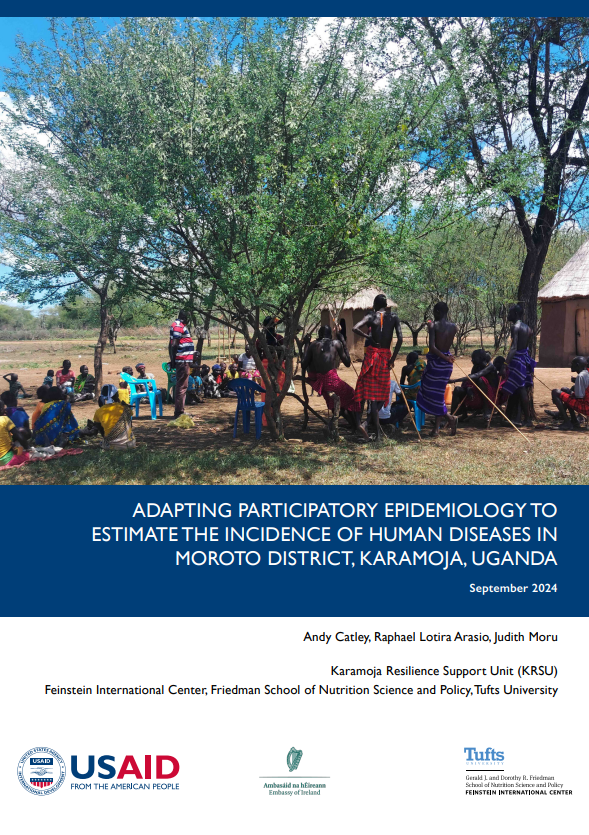
Adapting participatory epidemiology to estimate the incidence of human diseases in Moroto District, Karamoja, Uganda
This study explored the use of participatory epidemiology (PE) to estimate the annual incidences of human diseases in Karamoja, Uganda, with emphasis on diseases associated with water. Adapted PE methods were used successfully to estimate disease incidences in young children and adults, and revealed a rich knowledge on the clinical signs and causes of diseases. The report concludes that PE could be useful for overcoming some of the spatial limitations of the health surveillance system in Karamoja, and the temporal limitations of bi-annual food security and nutrition assessments.
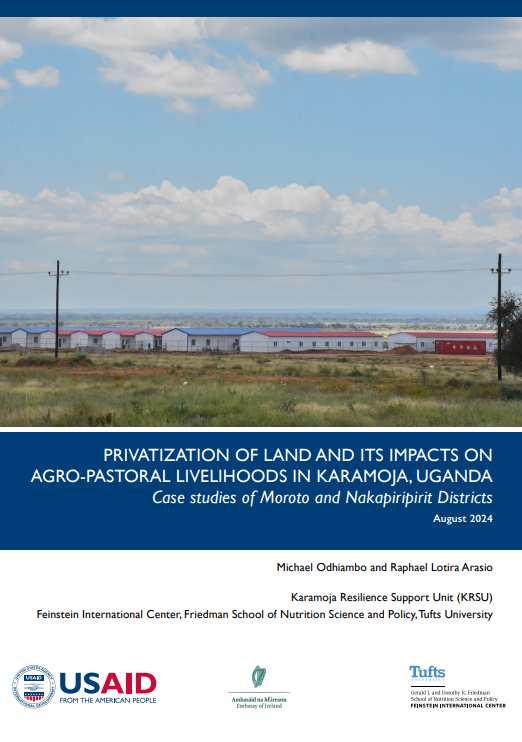
Privatization of Land and its Impacts on Agro-Pastoral Livelihoods in Karamoja, Uganda: Case studies of Moroto and Nakapiripirit Districts
This report presents the findings of a review of land issues in Karamoja, with a particular focus on trends in privatization of communal lands and its impacts on agro-pastoral livelihoods.
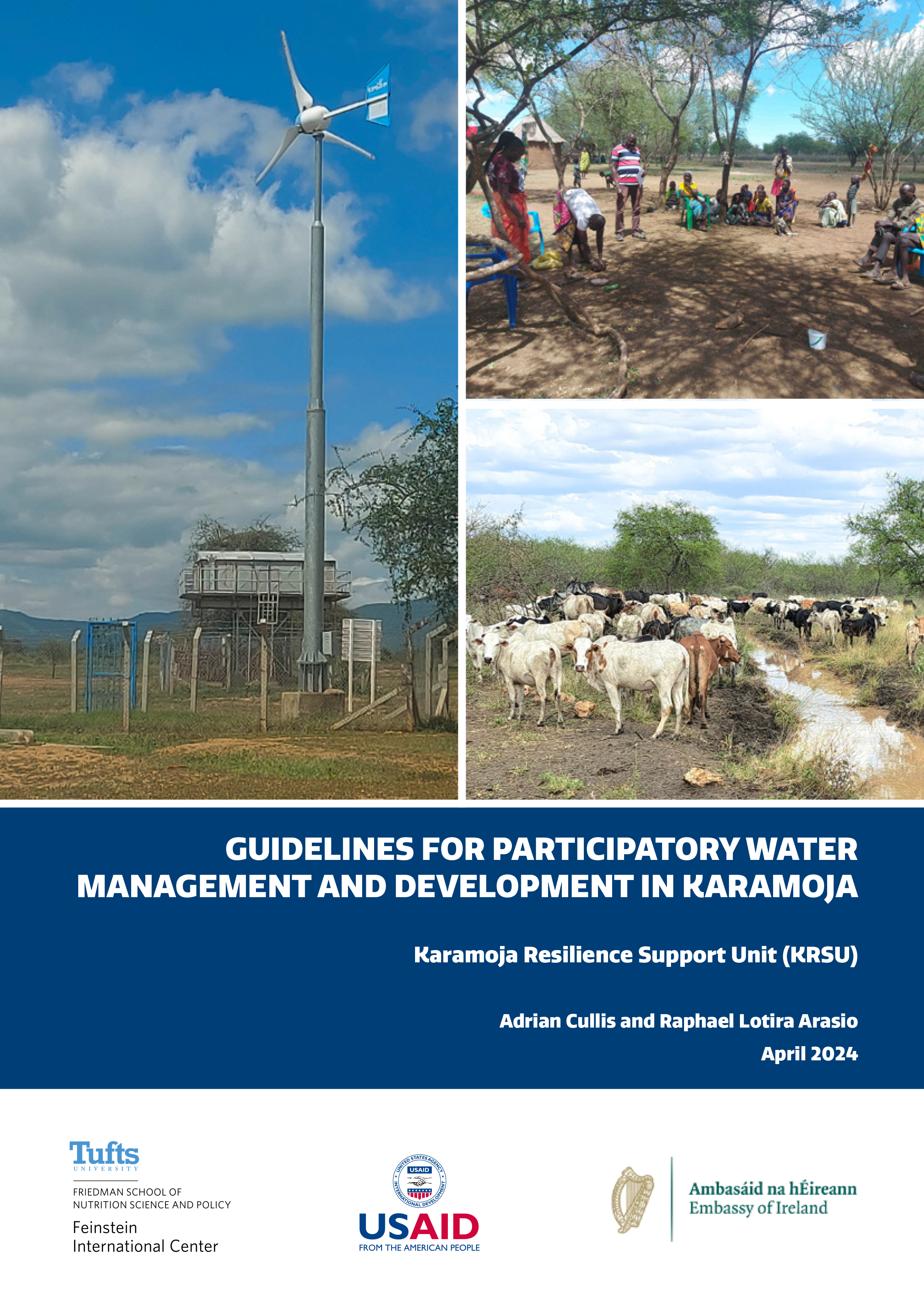
Guidelines for Participatory Water Management and Development in Karamoja
Water resources support key sectors of the economy namely: hydropower generation, agriculture, fisheries, domestic water supply, industry and navigation among others. However, the efficiency and sustainability of water utilization has recently been a concern in Uganda mainly due to inadequate sectoral collaboration in planning and implementation, increasing frequency of floods and droughts, environmental degradation and pollution of water resources.
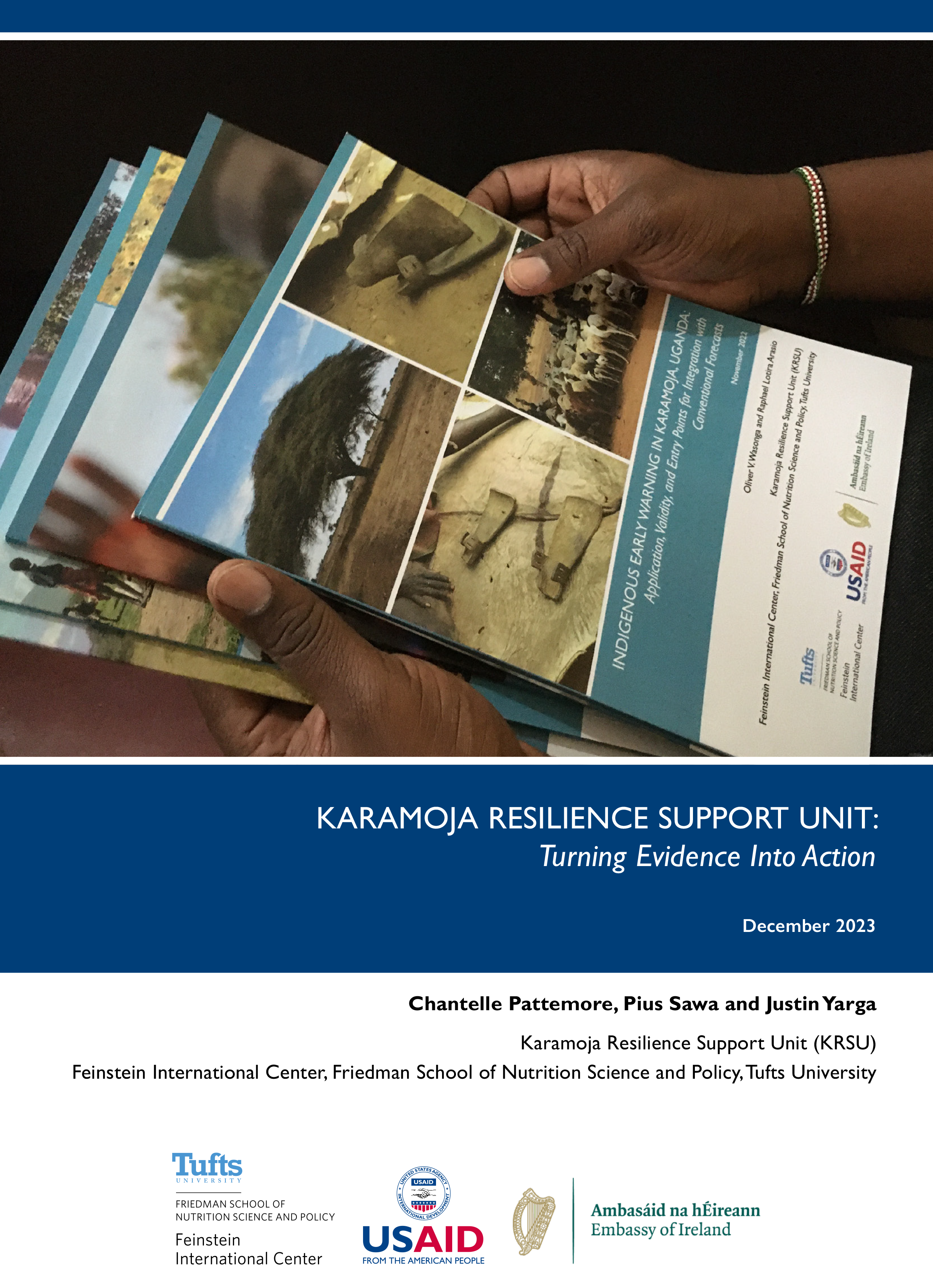
KARAMOJA RESILIENCE SUPPORT UNIT: Turning Evidence Into Action
To gauge understanding of how KRSU’s work benefits and is utilized in Karamoja, a rapid review was conducted in November and December 2023. The review involved face-to-face interviews with a number of the organization’s partners – including non-governmental organizations (NGOs), universities, academics, and donors.
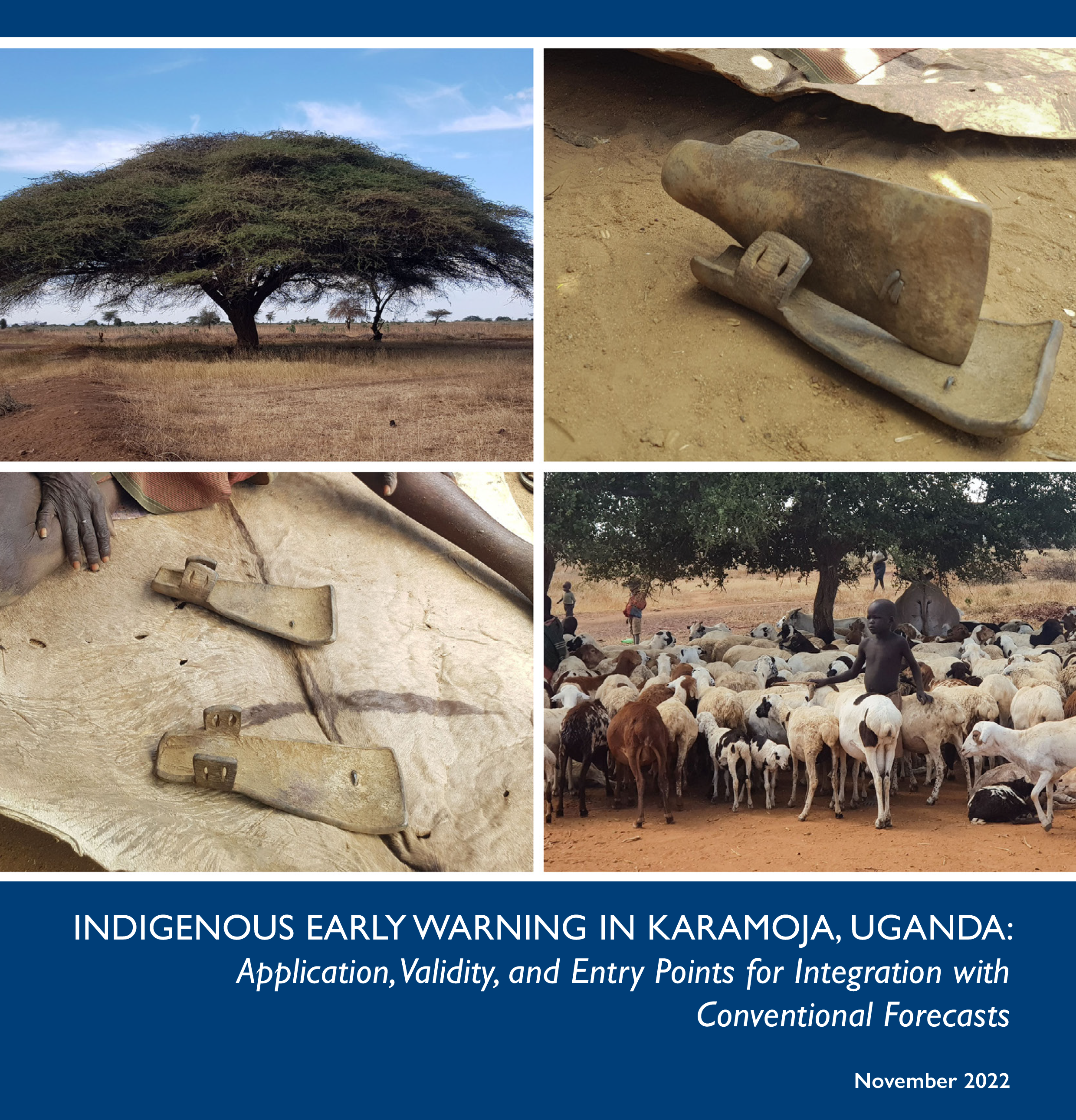
INDIGENOUS EARLY WARNING IN KARAMOJA, UGANDA
An effective early warning system (EWS) is a prerequisite for timely response to avert and mitigate the impacts of disasters that affect pastoralist and agro-pastoralist communities. Whereas there exist various forms of EWS in Uganda, the main concerns have been whether the early warning information is timely, accurate, accessible, and elicits early action. These questions point at inefficiencies in the conventional EWS in the country and the importance of the indigenous early warning system (IEWS) used by rural communities. These indigenous systems are especially important where conventional early warning information is inaccessible or coarse and therefore not suitable for guiding location-specific decisions.
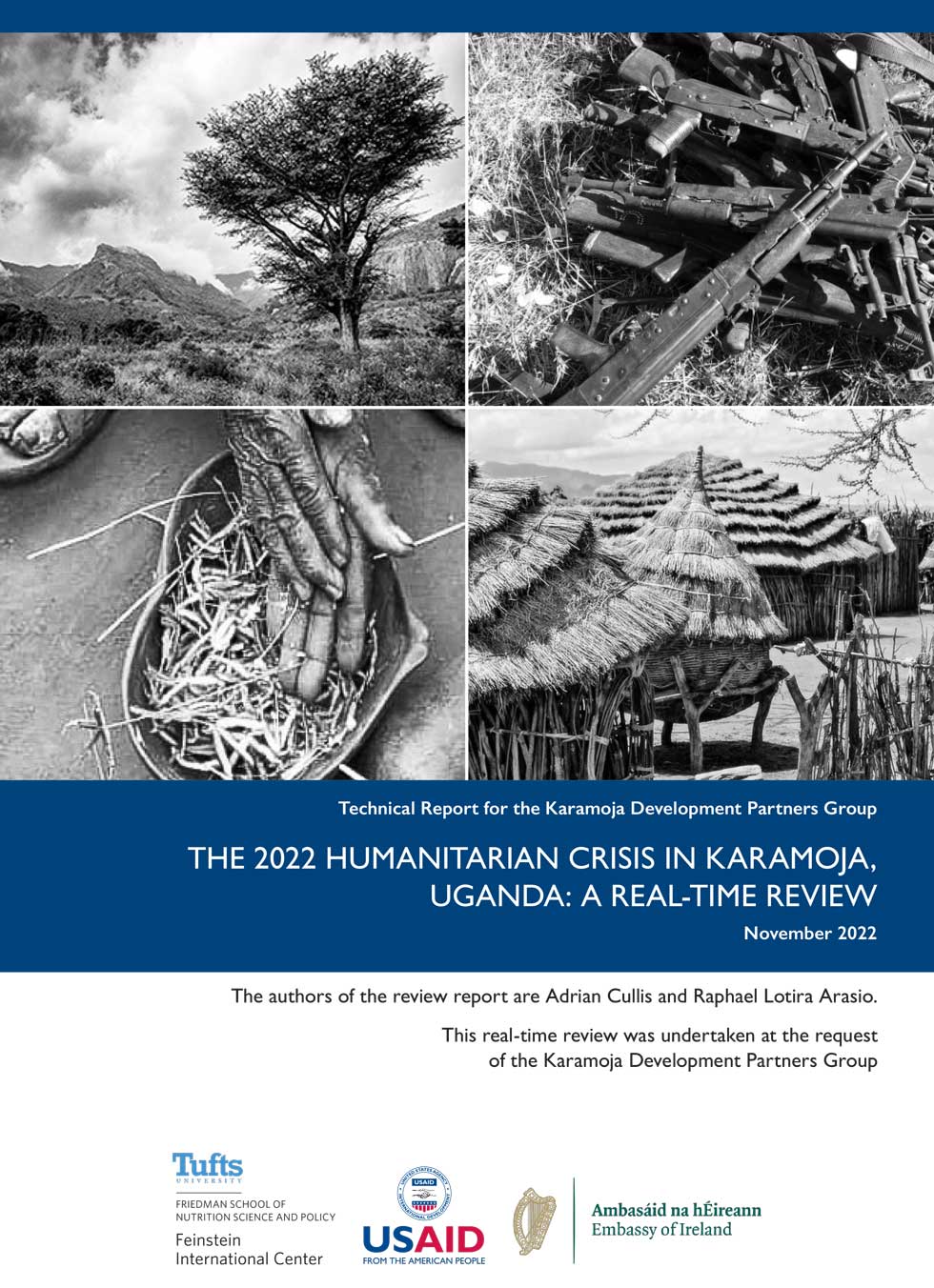
The 2022 Humanitarian Crisis in Karamoja, Uganda: A real-time review
This real-time review aims to document the events that led to Karamoja’s hunger crisis in 2022, the reporting of the worsening situation by early warning systems, and the responses of the Government of Uganda and the international aid community. The review took place from the September 27–October 21, 2022.
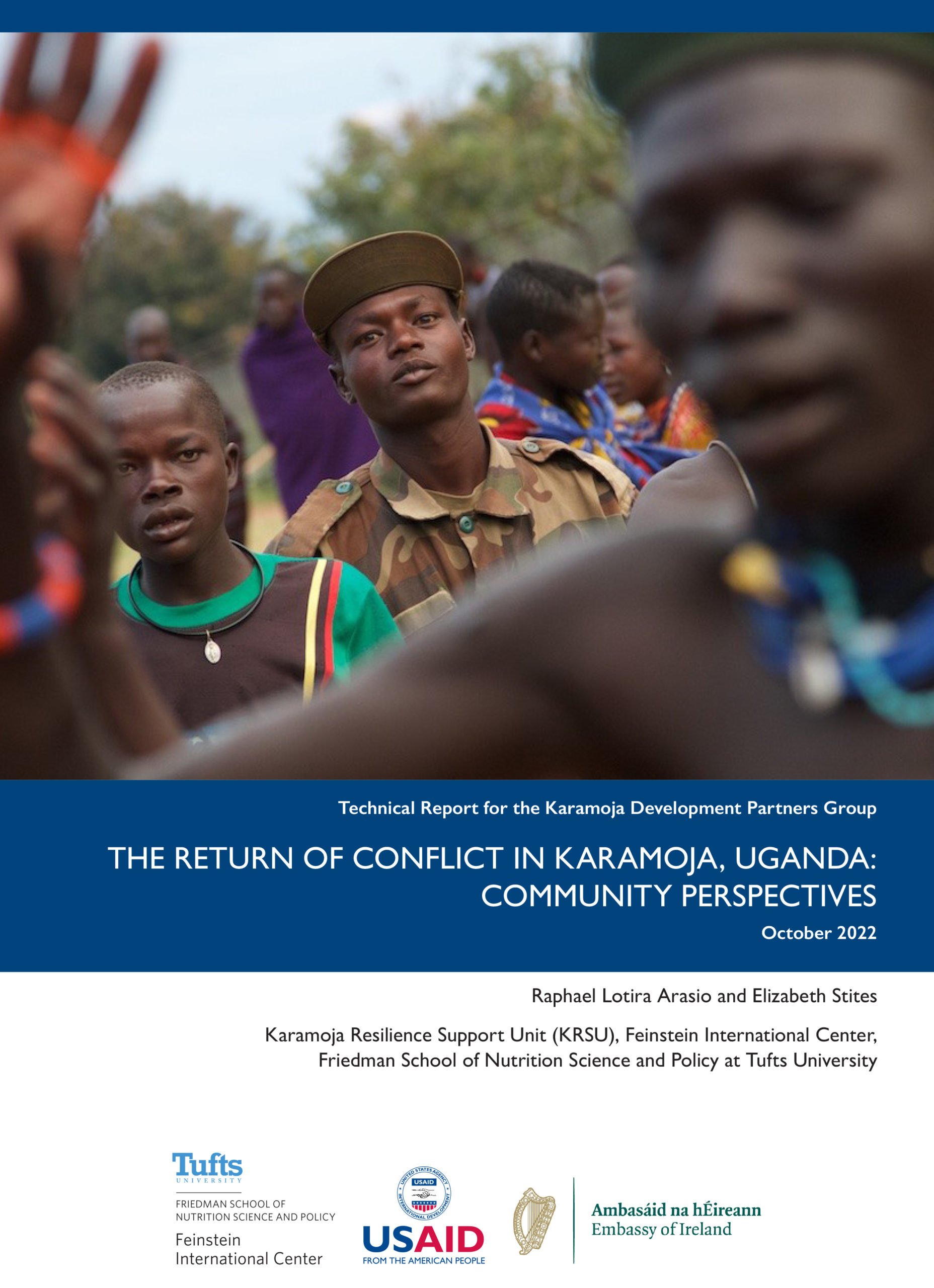
The Return of Conflict in Karamoja, Uganda: Community Perspectives
After nearly 10 years of relative peace, conflict and insecurity returned to the Karamoja sub-region of northeastern Uganda starting in 2019. This assessment investigates this resumption of conflict and insecurity from the perspective of the communities most involved and affected.
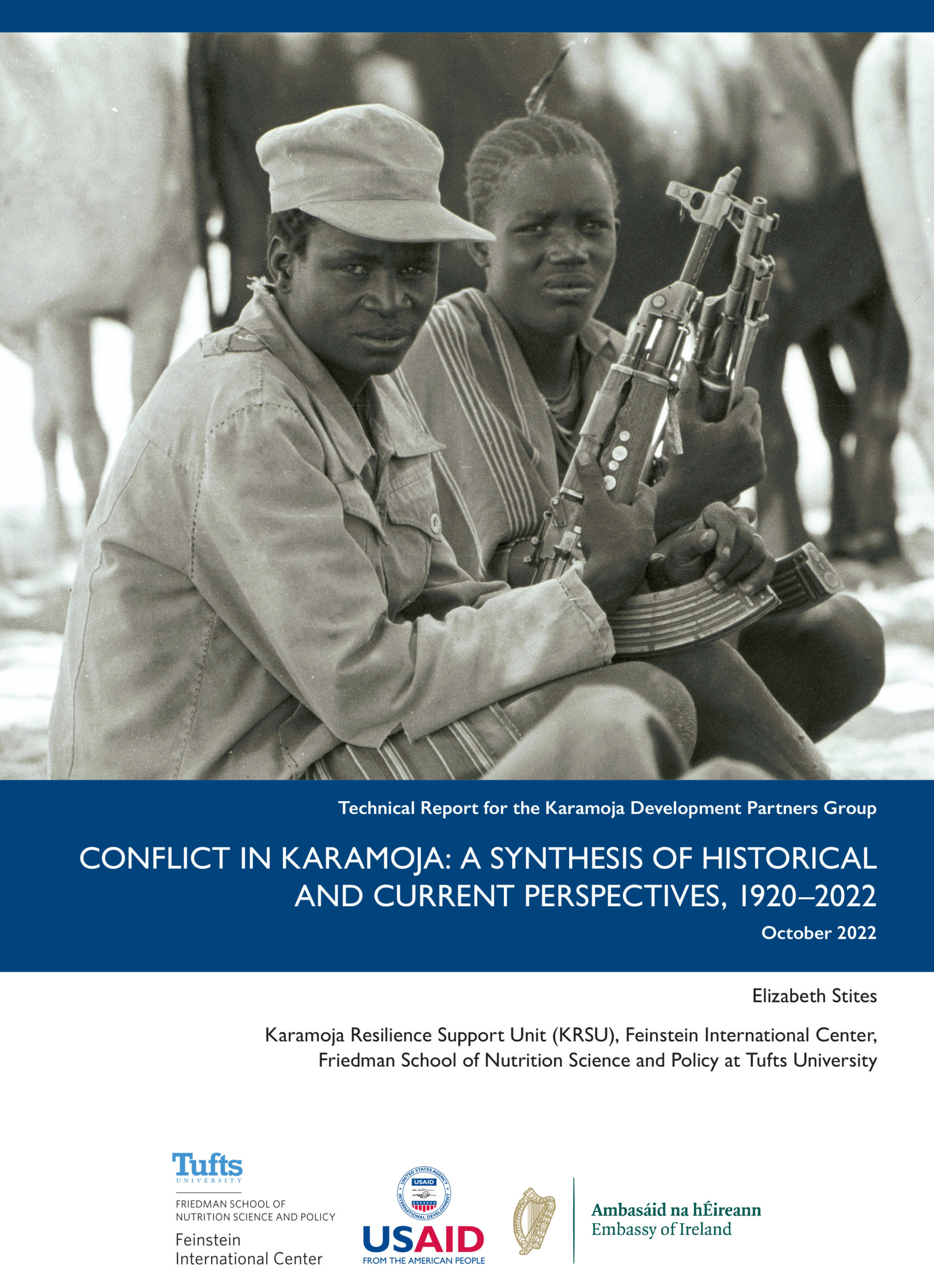
Conflict in Karamoja: A Synthesis of Historical and Current Perspectives, 1920-2022
This knowledge synthesis focuses on violent conflict in the Karamoja sub-region of northeastern Uganda. While violence and conflict both can and do take many forms, this synthesis takes as its focus the phenomenon of cattle raiding and associated violence. This knowledge synthesis briefly describes the concept and role of cattle raiding within pastoral societies in East Africa and the Karamoja Cluster and then examines different historical periods and experiences of violent conflict associated with cattle raiding within the Karamoja sub-region.
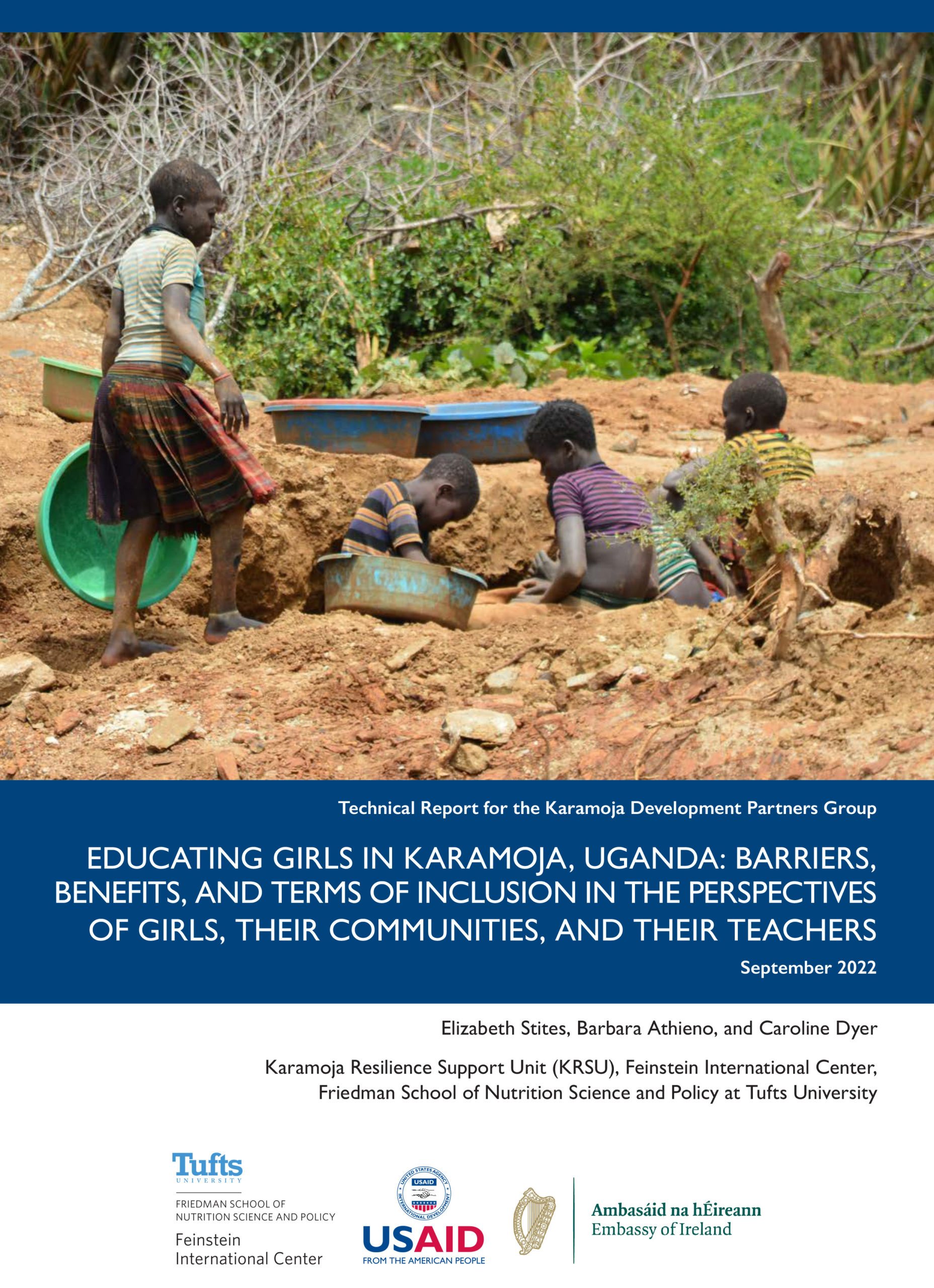
Educating Girls in Karamoja, Uganda: Barriers, Benefits, and Terms of Inclusion in the Perspectives of Girls, their Communities, and their Teachers
This scoping report investigates barriers, benefits, and “terms of inclusion” for girls’ education in the Karamoja sub-region of Uganda. Karamoja has some of the lowest education indicators in the country, with females generally faring much worse than males. The report examines the experiences and perceptions of girls, male and female community members, and teachers about girls’ education in the region, drawing on an assessment that took place from June to August 2022 in 10 sites in four districts: Amudat, Kaabong, Moroto, and Napak.
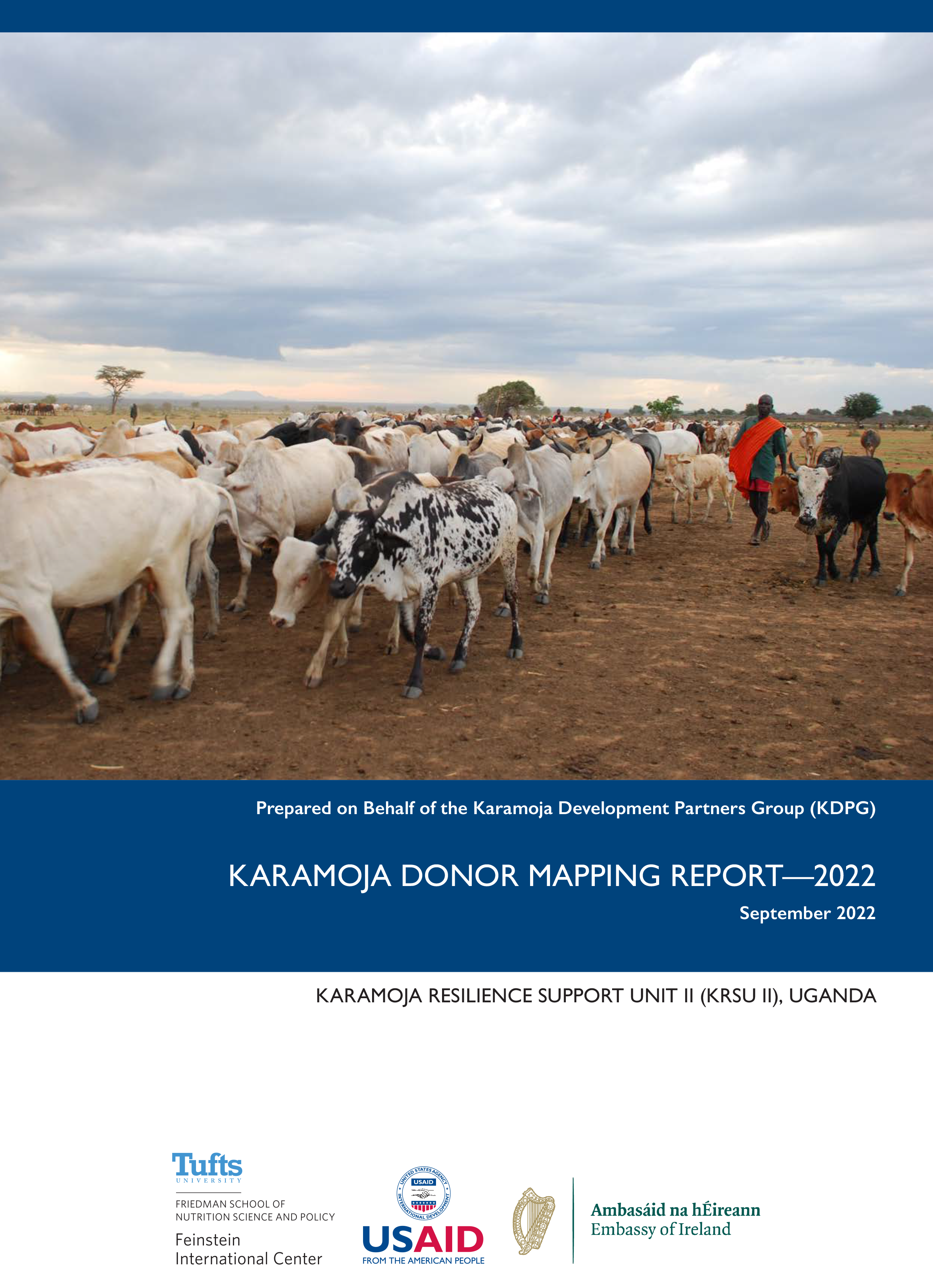
Karamoja Donor Mapping Report
This report summarizes planned humanitarian and development activities of major donors in the Karamoja sub-region
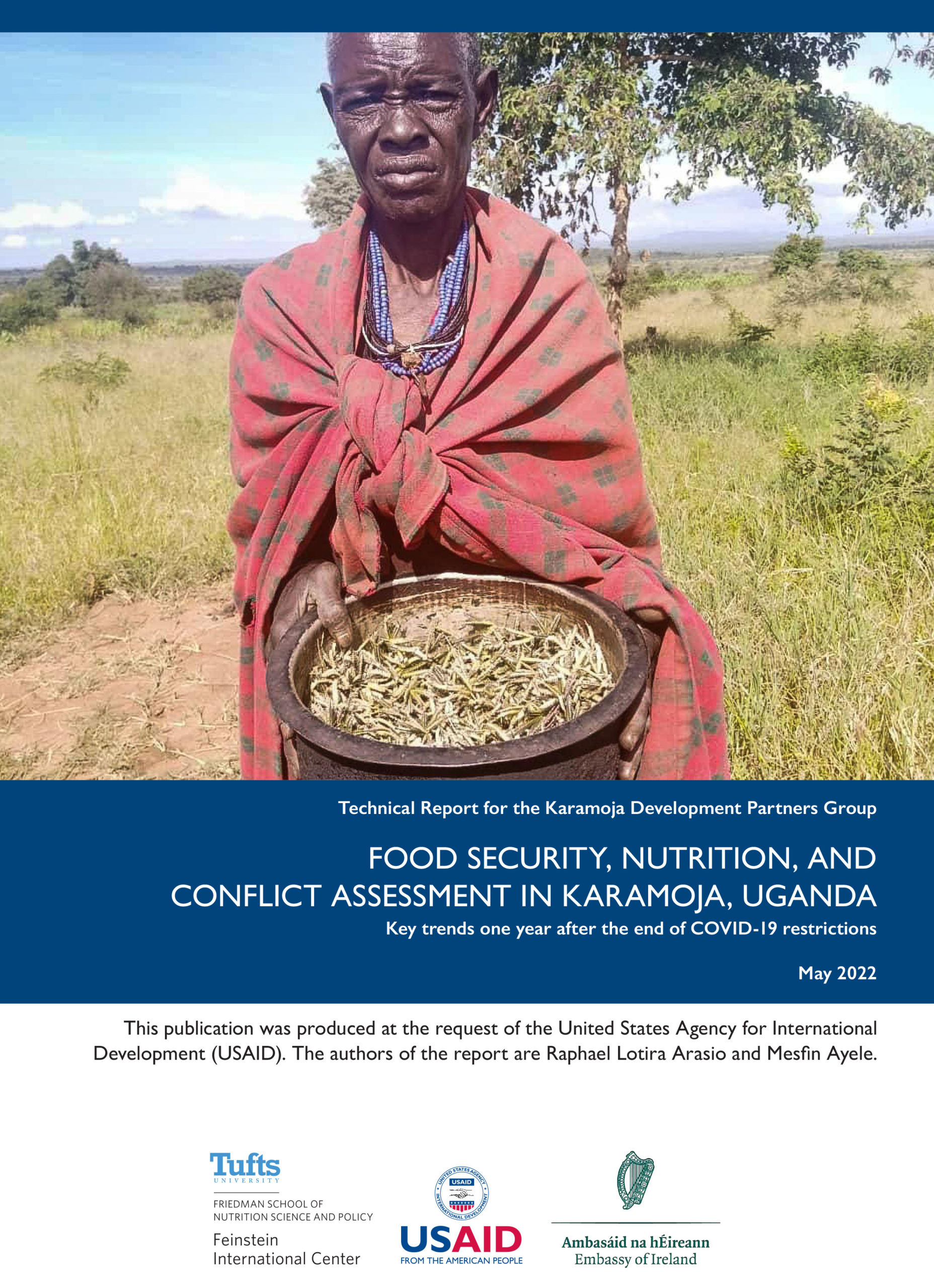
Food Security, Nutrition, and Conflict Assessment in Karamoja, Uganda
In mid-2020, the Karamoja Resilience Support Unit (KRSU) conducted a rapid assessment that described the impact of COVID-19 containment measures on rural livelihoods in Karamoja (Arasio et al. 20201). The assessment also forecast how disease restrictions would affect livelihoods over the following six to eight months (into early 2021). The initial assessment examined household wellbeing during COVID-19 relative to a normal (good) and bad (drought) year in Karamoja’s three main livelihood zones, represented by Amudat District (predominantly pastoralist but with some emerging crop production), Moroto District (predominantly agropastoralist), and Abim District (with high dependence on crop production, but also using livestock).
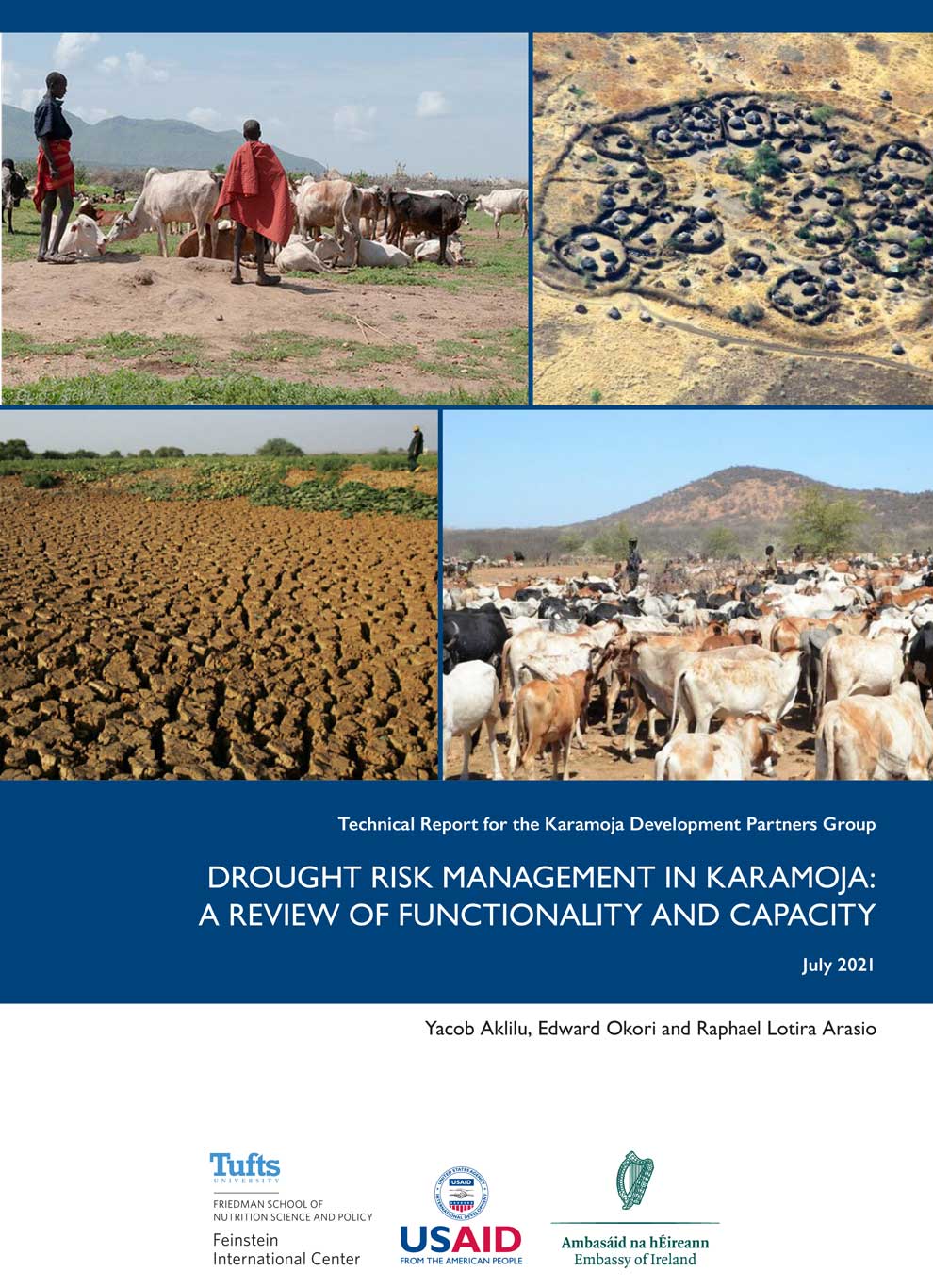
Drought Risk Management in Karamoja: A Review of Functionality and Capacity
In the history of Karamoja, drought has been one of the most important types of disaster, with major impacts on livelihoods. For livestock-owning households, drought can push both wealthy and poorer households into destitution, and the recovery of herds, their main form of financial capital, takes many years. Drought also has serious impacts on crop production and can decimate harvests. In the case of livestock interventions, there have been notable developments in effective drought response in many countries in the wider East Africa region, including novel partnerships between government, non-governmental organizations (NGOs) and private sector to provide early and more cost-effective programming.
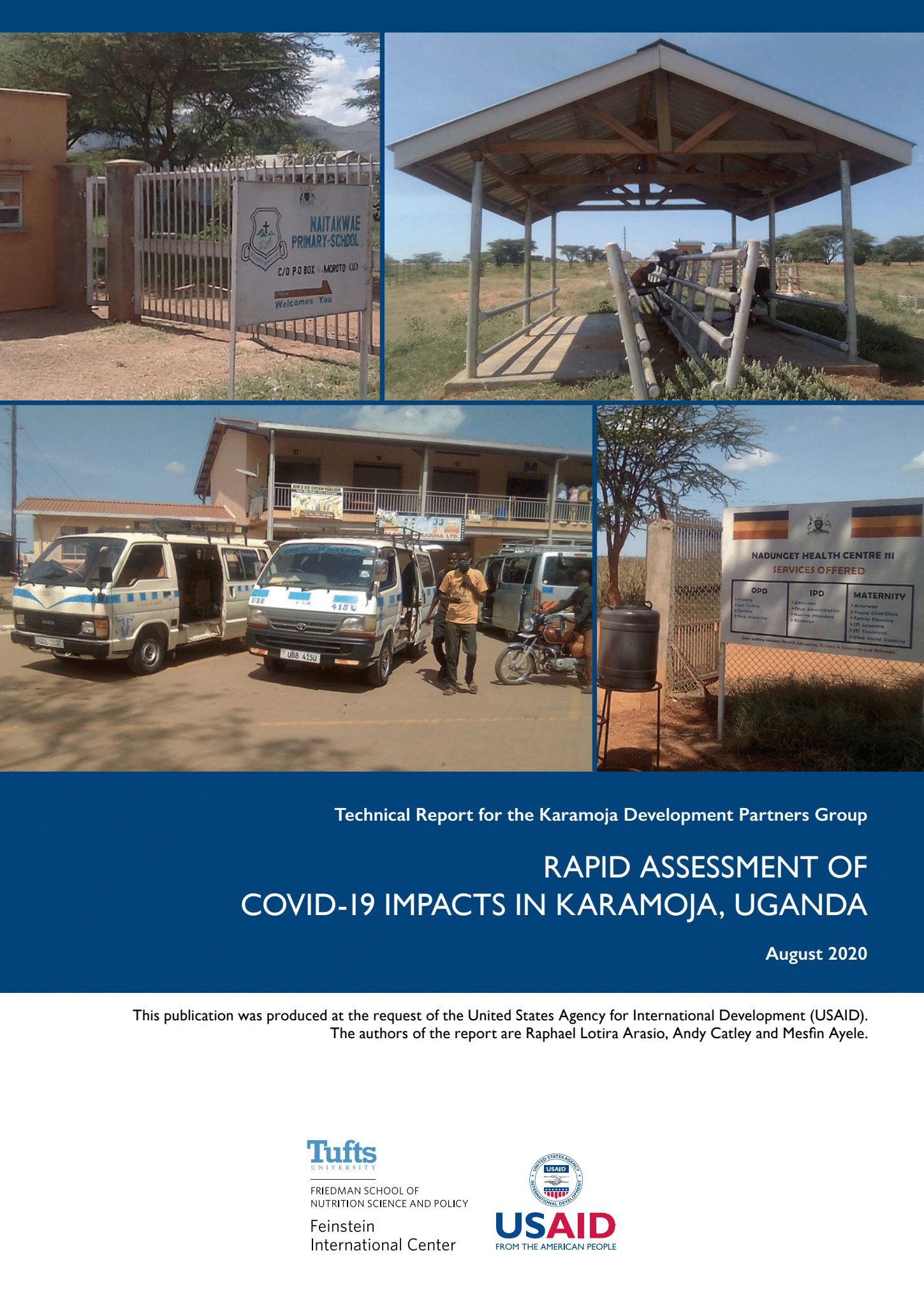
RAPID ASSESSMENT OF COVID-19 IMPACTS IN KARAMOJA, UGANDA
This technical report describes the impacts of coronavirus disease 2019 (COVID-19) restrictions in the Karamoja sub-region of Uganda, based on field assessments in Amudat, Moroto and Abim Districts. The COVID-19 prevention guidelines that prompted total lockdown measures included market closure and travel restrictions which in turn affected the essential economic activities of many households, especially the poor.
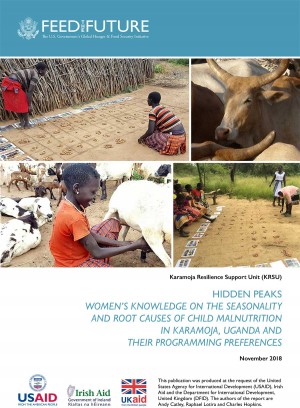
Hidden Peaks: Women’s Knowledge on the Seasonality and Root Causes of Child Malnutrition in Karamoja, Uganda and Their Programming Preferences
This report from the KRSU uses participatory epidemiology to understand women’s knowledge on the seasonality and causes of child malnutrition in Karamoja. The report provides important new information on the timing of peaks in child malnutrition, women’s views on the main causes of malnutrition and the relative importance of these causes, and women’s preferences for programs to reduce malnutrition
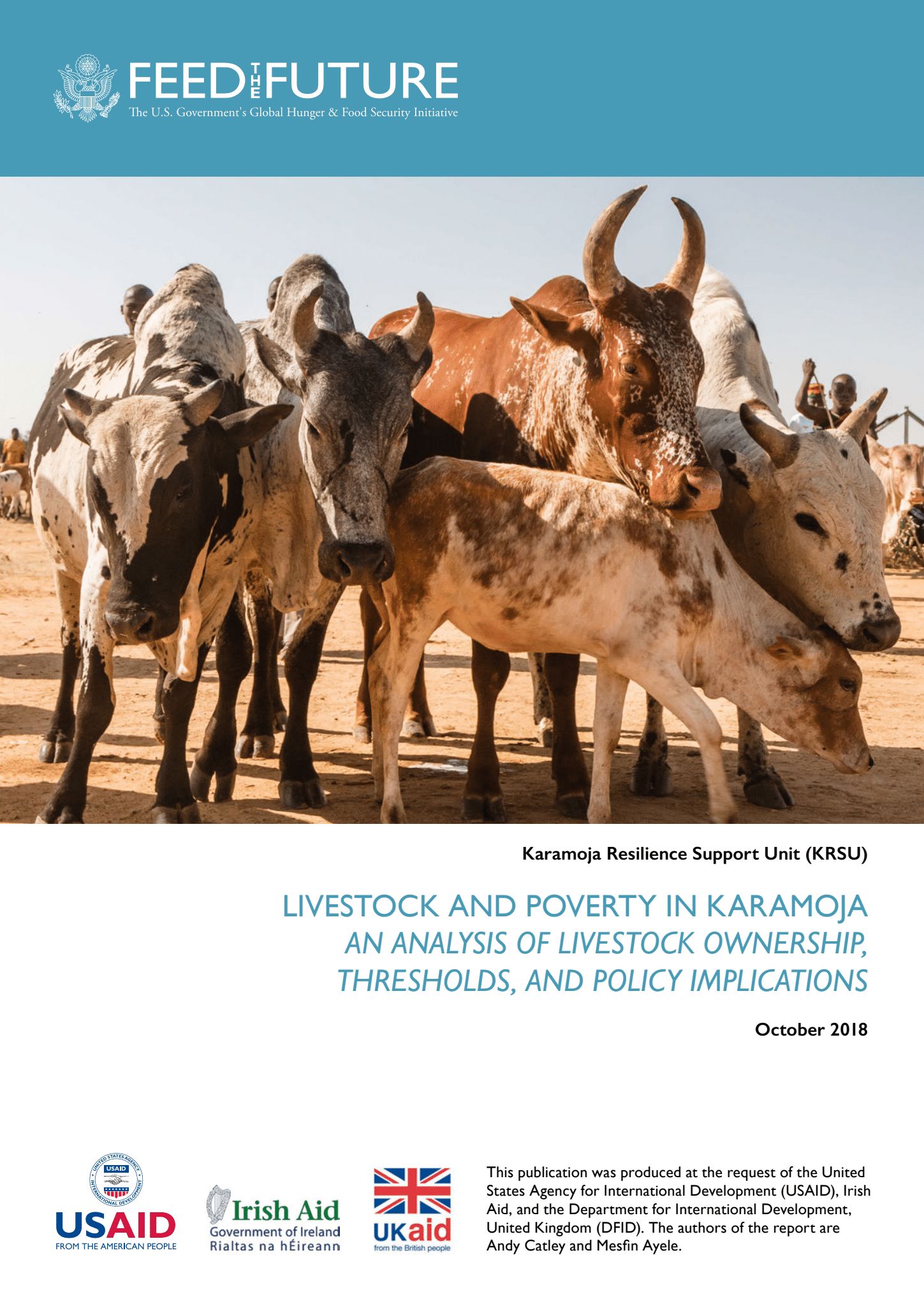
LIVESTOCK AND POVERTY IN KARAMOJA AN ANALYSIS OF LIVESTOCK OWNERSHIP, THRESHOLDS, AND POLICY IMPLICATIONS
In pastoralist and agro-pastoralist households in East Africa, livestock not cash are usually the main financial asset. Animals are sold to buy grain and to meet other domestic needs, and animals also provide food, especially milk, for direct human consumption.
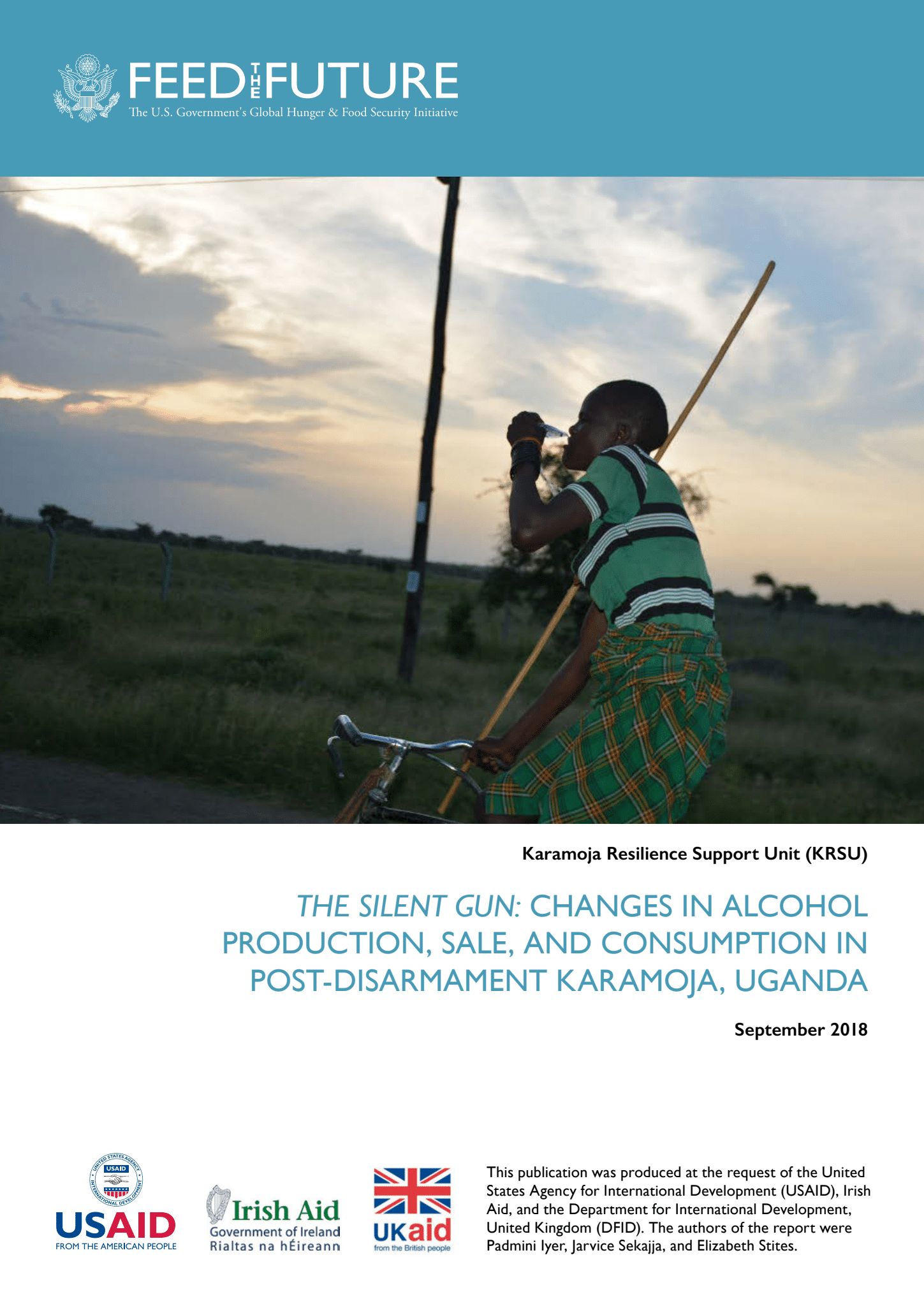
THE SILENT GUN: CHANGES IN ALCOHOL PRODUCTION, SALE, AND CONSUMPTION IN POST-DISARMAMENT KARAMOJA, UGANDA
Research and observations over the past decade have pointed to the high prevalence of alcohol use in Karamoja. Brews made locally of sorghum and maize have sociocultural, nutritional, and economic significance.
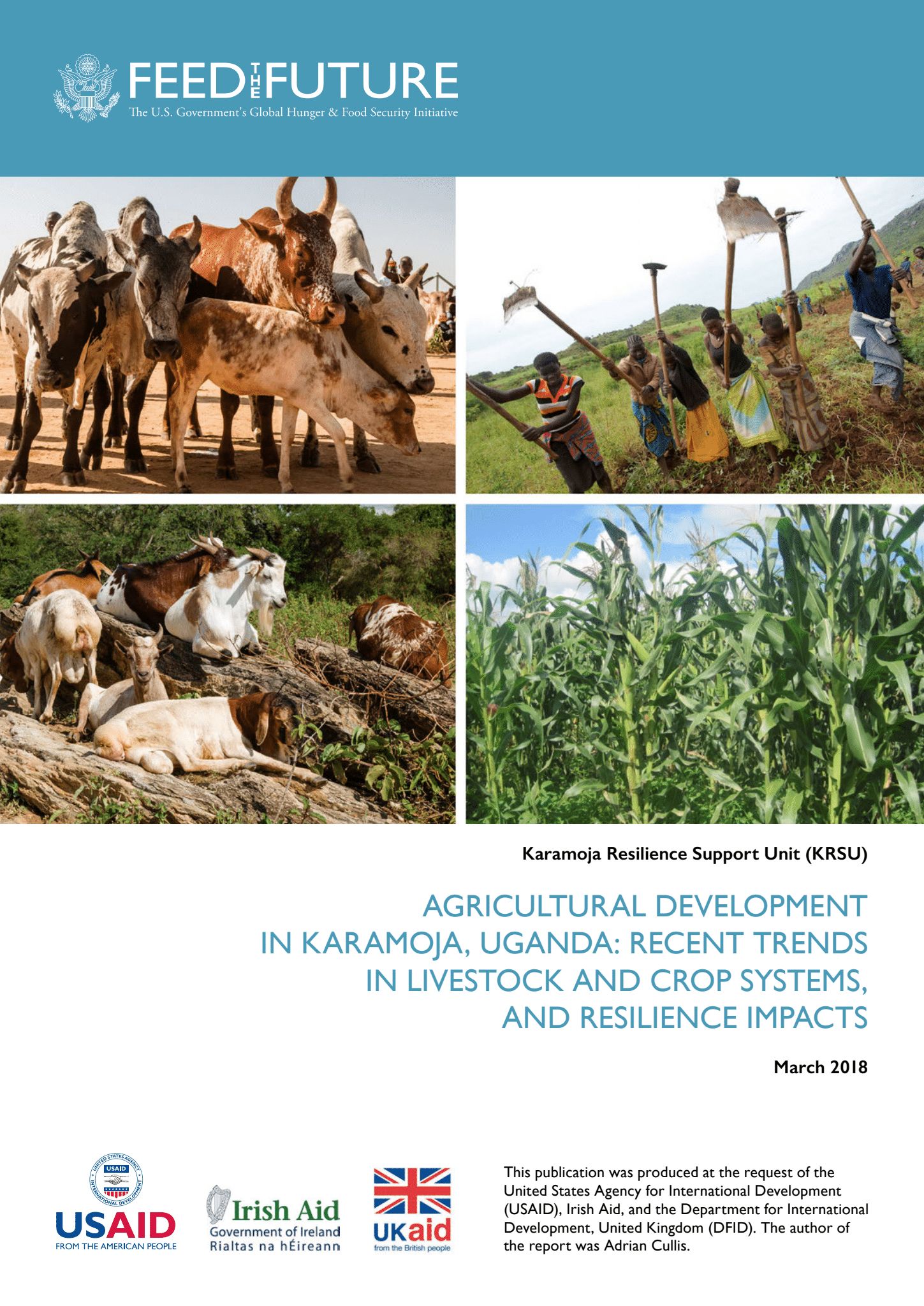
AGRICULTURAL DEVELOPMENT IN KARAMOJA, UGANDA: RECENT TRENDS IN LIVESTOCK AND CROP SYSTEMS, AND RESILIENCE IMPACTS
This report is a review of agricultural development trends in the Karamoja sub-region of northeast Uganda. The review covered both crop farming and transhumance livestock management and examined agriculture at the levels of both policy and programming.
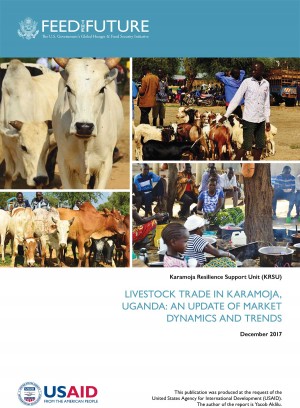
Livestock Trade in Karamoja Uganda – An Update of Market Dynamics and Trends
The KRSU has released an update on livestock marketing in Karamoja, providing comprehensive information on markets dynamics, price and volume trends, and other market performance indicators.
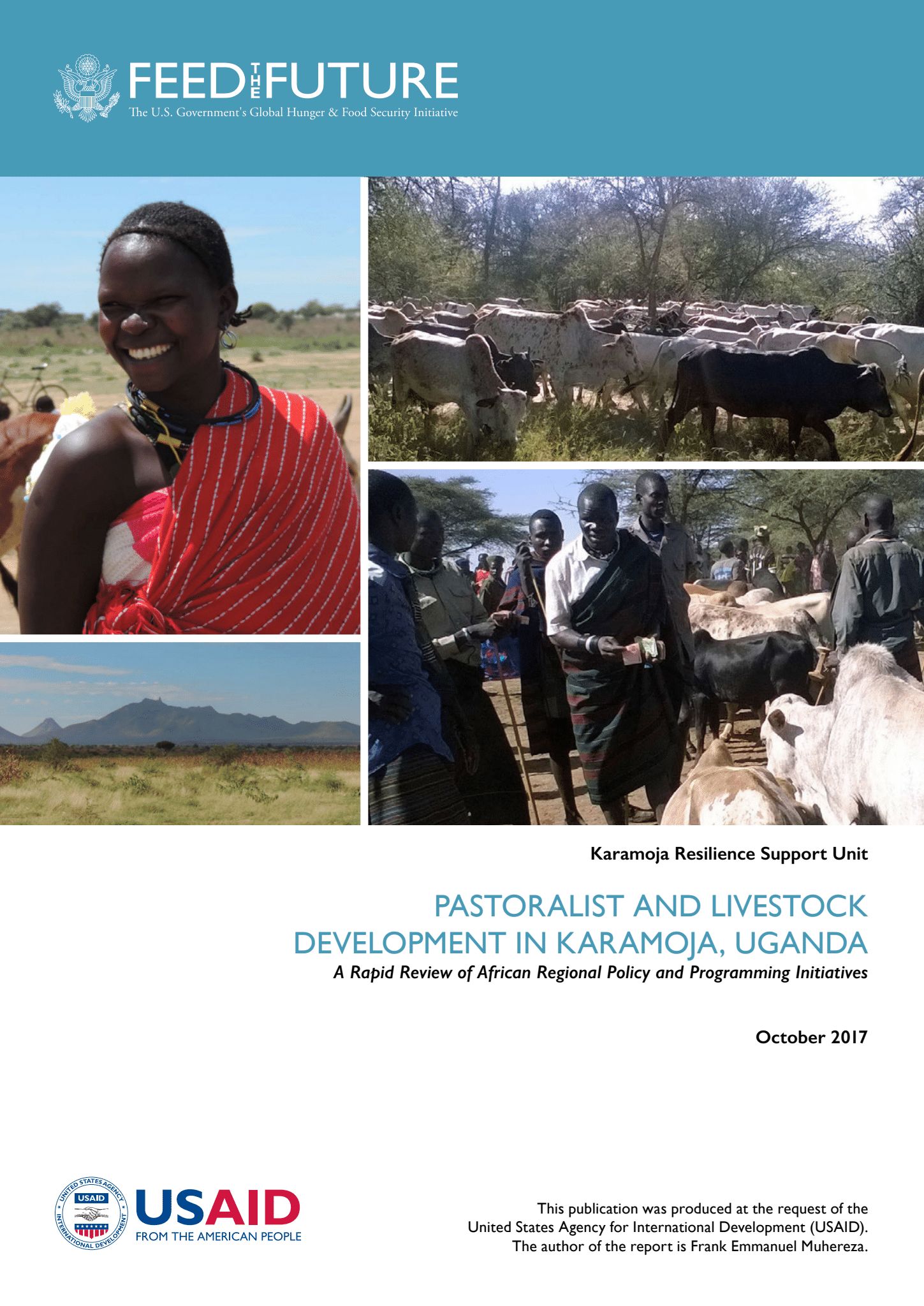
PASTORALIST AND LIVESTOCK DEVELOPMENT IN KARAMOJA, UGANDA
This review examines regional policies and programming initiatives in East Africa and the Horn of Africa related to pastoral areas development, and their relevance to the Karamoja Region of Uganda.
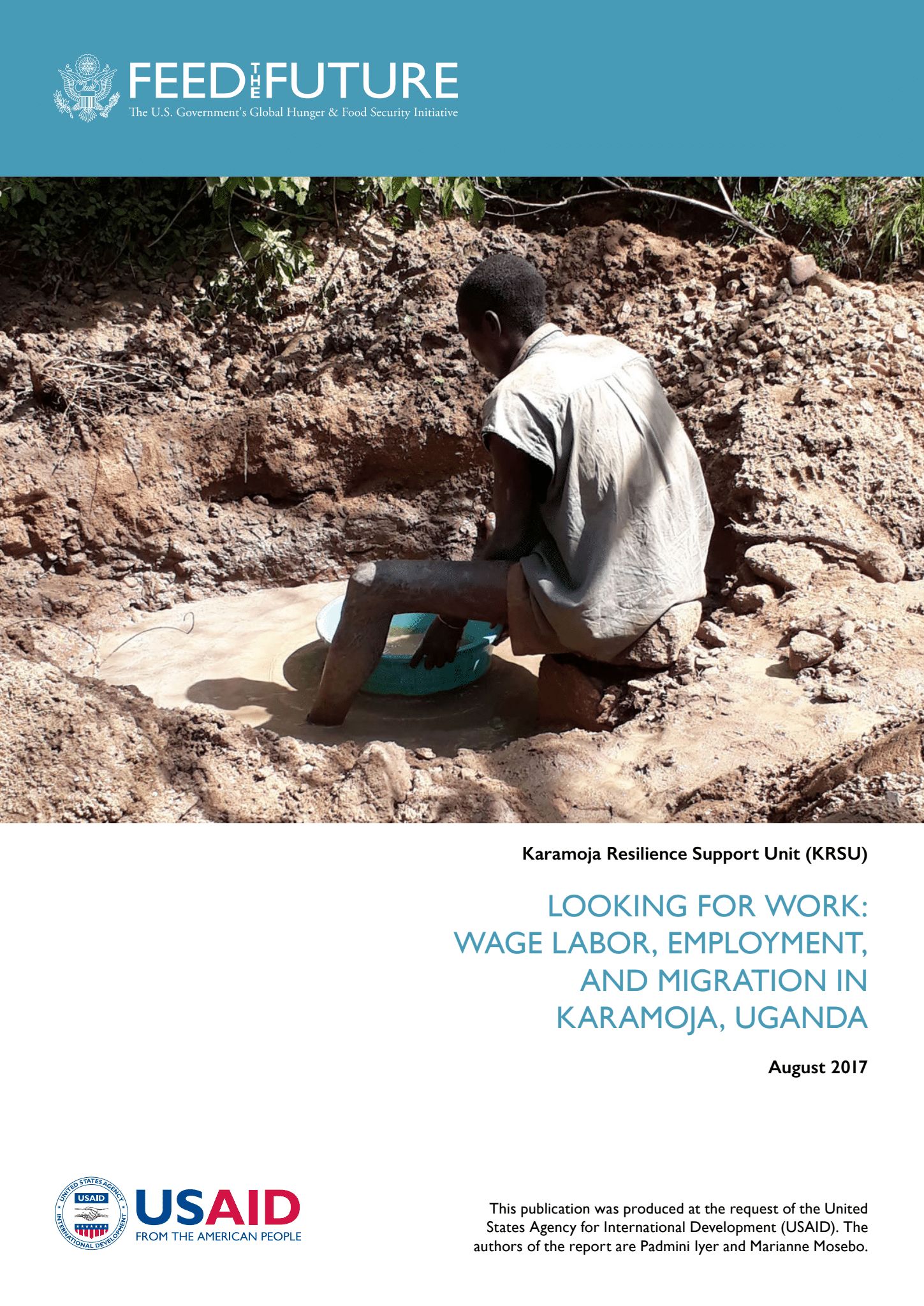
LOOKING FOR WORK: WAGE LABOR, EMPLOYMENT, AND MIGRATION IN KARAMOJA, UGANDA
The main purpose of this assessment is to document and analyze trends in labor and employment in the non-pastoral labor sectors within and outside Karamoja, and to investigate how individual- and macrolevel factors influence participation in the labor market.
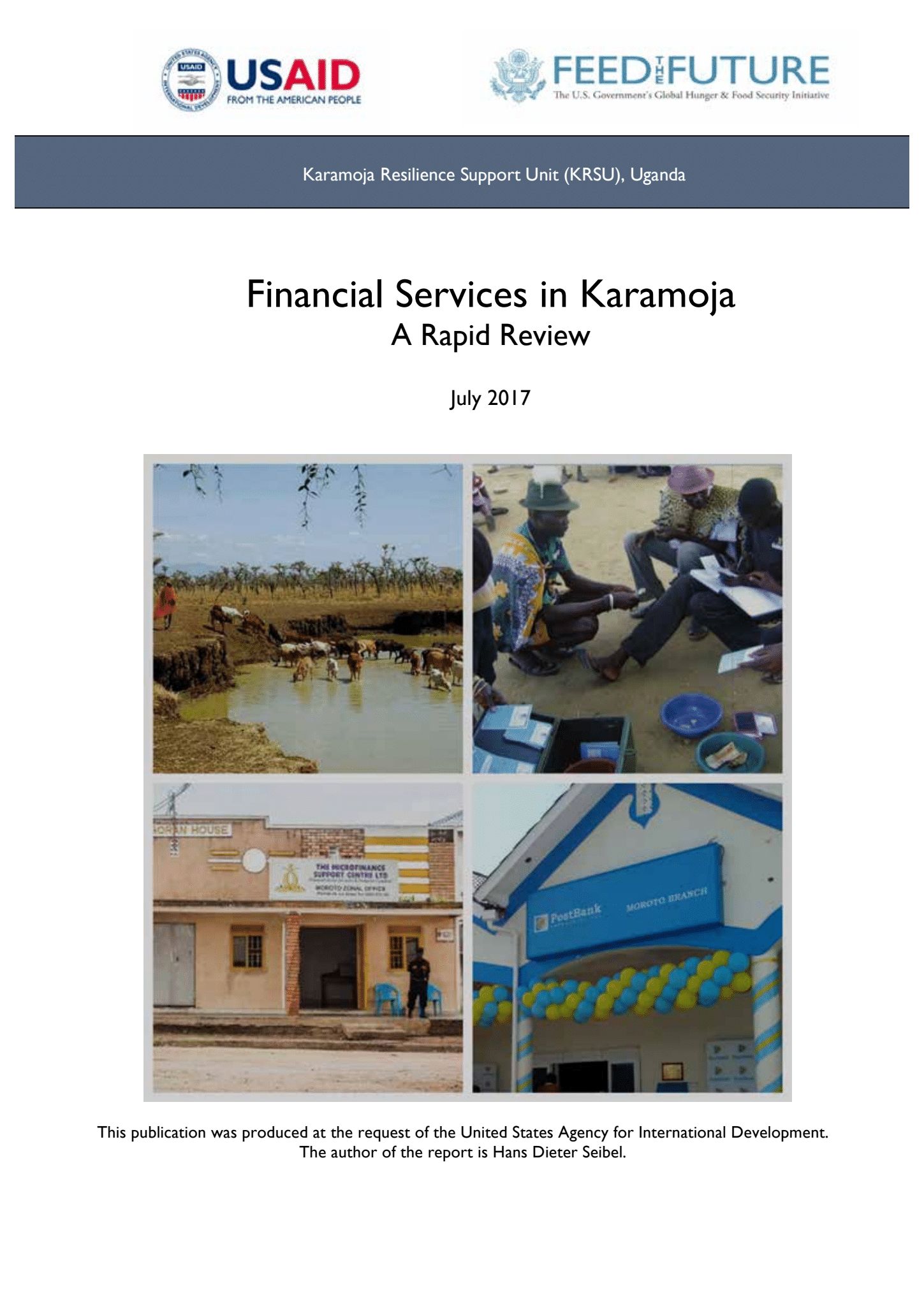
Financial Services in Karamoja A Rapid Review
The review is an initial exploratory and rapid assessment of financial services in the region and was conducted over a short time frame. The aim to flag issues for more detailed analysis and follow up, rather than being a comprehensive study on financial services.
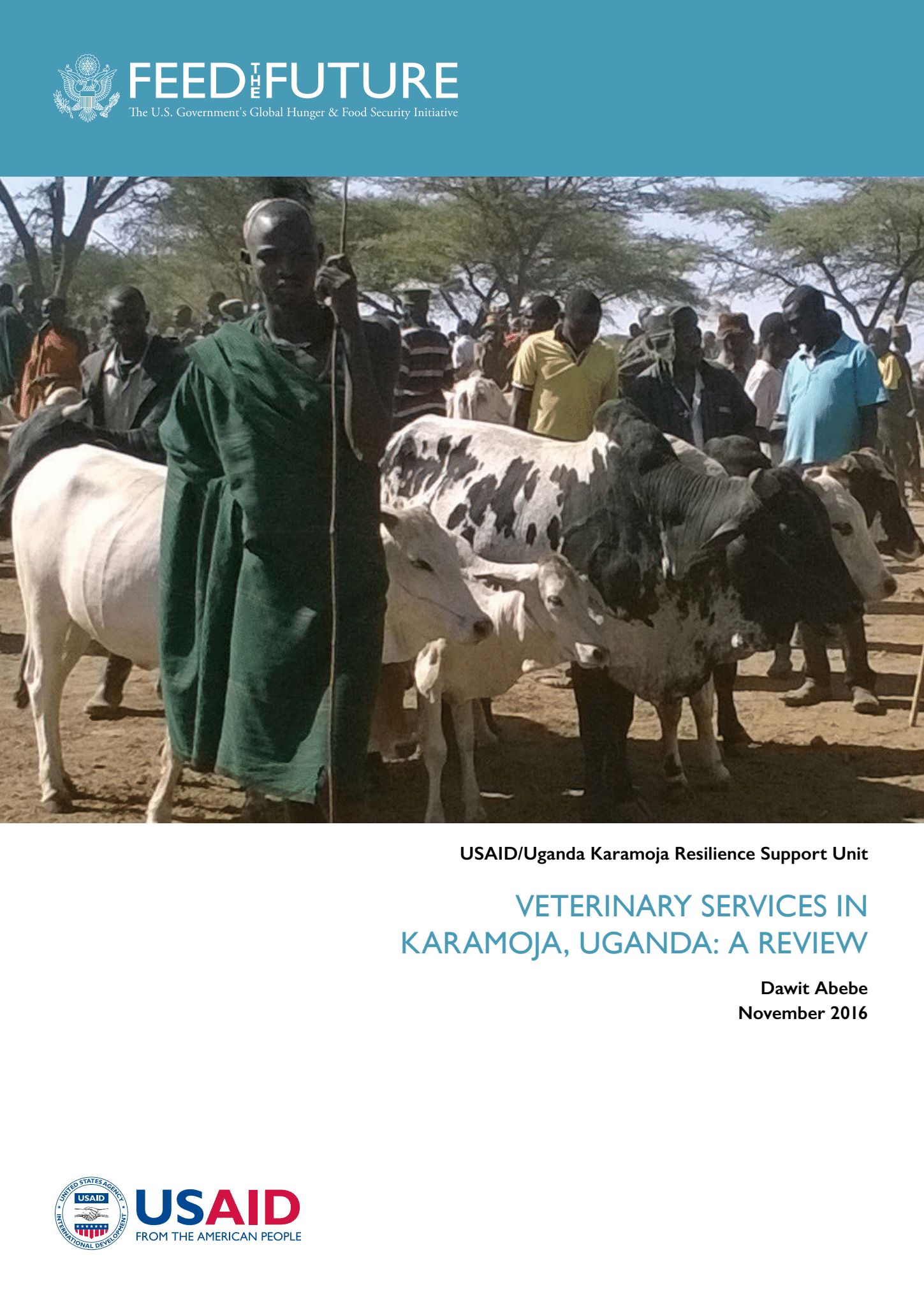
VETERINARY SERVICES IN KARAMOJA, UGANDA: A REVIEW
This aim of this report is to document the experiences of veterinary service delivery in Karamoja and draw lessons to guide a strategy for future service provision, aligned to Uganda’s animal health policies and legislation.
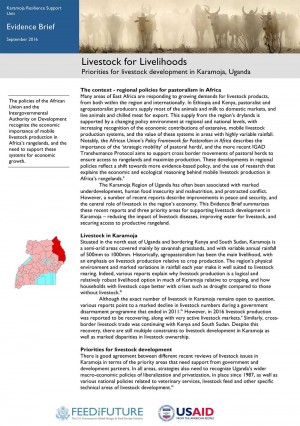
Livestock for Livelihoods: Priorities for livestock development in Karamoja, Uganda
An evidence brief on livestock development in Karamoja, Uganda. Recommendations include revitalization of veterinary services is a priority, water development for livestock, and local land use planning by local governments with communities. The African Union’s Policy Framework for Pastoralism in Africa provides an overarching Africa-wide policy to which new policies on range land and pastoralism in Uganda can be aligned, with recognition of the importance of strategic herd mobility.
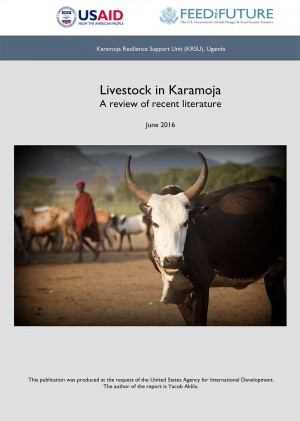
Livestock in Karamoja: A review of recent literature
The review synthesizes the main issues impacting livestock production in the region and identifies critical factors affecting livestock production. This review is drawn largely from the literature produced during the last five years on Karamoja generally, and more specifically on the livestock sector in Karamoja. Additional information was obtained through interviews in Kampala and Moroto with Government and NGO staff in April and May 2016.